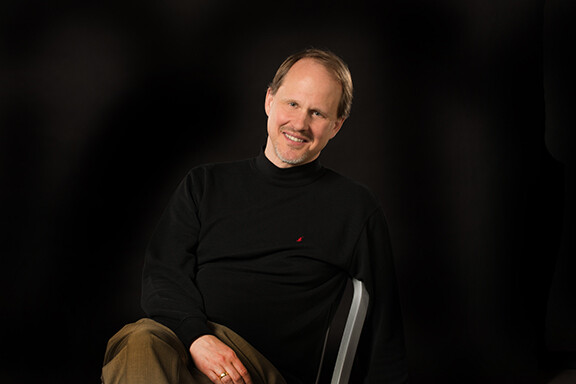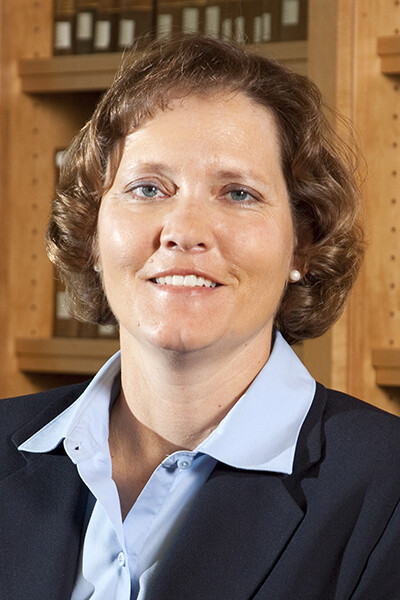
Hans Sturm, associate professor of double bass and jazz studies and area head for strings, will travel to Paris in December to receive two awards from the International Rabbath Institute.
Sturm will receive the Prize and Diploma for Performance Excellence and the Prize and Diploma of Professor from the institute, which is founded by noted bassist François Rabbath.
“I could not be more excited at the news of this prestigious award for Dr. Sturm,” said John Richmond, professor and director of the Glenn Korff School of Music. “Hans has enjoyed an international profile as an artist and pedagogue for many years.”
Born in Syria and raised in Lebanon, Rabbath is a self-taught bassist. In 1955, he went to Paris to study at the Paris Conservatory.
“He discovered upon his arrival that he actually played as well as the teacher at the conservatory, so he began to play professionally right away,” Sturm said.
A virtuoso player, Rabbath’s major contribution to bass pedagogy is represented in his method book, “Nouvelle technique de la contrebasse.” The main difference in his approach is Rabbath’s use of the left hand and his detailed attention to the bow arm.
“His way of teaching and way of approaching the instrument has completely revolutionized the bass,” Sturm said. “His students hold principal positions with major symphony orchestras, but also his technique is very versatile and includes some of the greatest jazz bass players of our time.”
Sturm purchased Rabbath’s first method book when it came out in 1984 and worked through the first three volumes.
“I had worked at it and studied it, but I was studying with other people and doing other things,” Sturm said.
In 2000, after hearing Sturm play at a professional conference, Rabbath encouraged him to come study in Paris. Sturm, who was teaching at Ball State University at the time, accepted the invite.
“I learned a lot from him and studied deeply with him during that window,” he said.
But then there was the issue of mastering Rabbath’s bowings.
“If you see the note and the finger above it and the string below it, you have an idea of what he’s asking the left hand to do,” Sturm said. “If you see a slur mark above with a bunch of dots, you don’t know exactly what’s entailed for the bow. I had been at this for several years. It’s his bow arm, and I can’t get it. I’m getting frustrated. And he said, ‘This is my fear. I’m not going to be able to transmit my bow arm.’”
During a return trip to Ball State, Sturm’s plane was delayed. He asked for reading material and was given a golf magazine.
“There was an article in there about a new Tiger Woods golf video game, and they have him in the skin-tight suit studying his biomechanics,” Sturm said. “And I thought, surely, if they can do this for a game, they can do this for a bow arm.”
He returned to Ball State and made a cold call to their biomechanics lab. That call led to a grant to create a study of Rabbath’s bow arm and the best-selling DVD “The Art of the Bow.”
They followed up with a second DVD in 2010 that focused on Rabbath’s left-hand technique. The DVDs include biomechanics animation and user-selectable camera angles, as well as interviews, performances and lecture-demonstrations.
“It’s one thing to see what’s on the written page and have a two-dimensional thing. It’s another thing to take a lesson with somebody and have that experience. But it’s another thing to be able to really study and change the angle and see the motion,” Sturm said.
After coming to UNL in 2011, Sturm participated in a Kansas City bass workshop that included Rabbath. Part of the workshop included a one-credit graduate class developed by Sturm and the School of Music for string music educators.
After hearing Sturm play during the workshop, Rabbath invited him back to Paris to receive the awards for teaching and performance.
“It was a culmination of a lot of things,” Sturm said of the awards. “It was him seeing what I have become, and certainly, I stand on the shoulders of all of my other teachers. It’s like a lifetime achievement award, so it means a lot to me.”
In addition to his trip to France, Sturm will also be traveling to New Zealand in November to serve as an external judge for the Graduate Music In Jazz Studies Exams and Recitals at the University of Auckland’s National Institute of Creative Arts and Industries.
He will examine the Doctor of Musical Arts final recital and participate as one of two external faculty in the oral exam of Olivier Holland, who is also a senior lecturer at the University of Auckland’s School of Music.
Other recent awards and honors earned by the UNL community include:
Faculty
• Dawne Y. Curry, associate professor of history and ethnic studies, will participate in the Sawyer Seminar at Carnegie Mellon University in Pittsburgh, Pennsylvania. The seminar will focus on the meaning of the term, “ghetto.” On Oct. 24, Curry will present her paper, “Their World is a Ghetto: Squatters, Space, and Power in 1940s Alexandra, South Africa.” Instead of racial segregation, it existed between Alexandra’s permanent dwellers and its temporary ones. Thus, Curry’s paper shows how Alexandra’s squatters’ movement was an exercise not only in geographical engineering but also in the formation of ghettoized communities that dotted the terrain of 1940s Johannesburg.
• Colleen Medill has been elected a fellow of the American College of Employee Benefits Counsel in recognition of her sustained outstanding performance in the law profession. Medill is the Robert and Joanne Berkshire Family Professor of Law in the University of Nebraska’s College of Law. She is the first fellow from Nebraska and will be inducted during the counsel’s 15th annual dinner and ceremony Oct. 25 in Washington, D.C.
The ACEBC was established in 2000 to recognize the nation’s leading experts in the field of employee benefits law. Election as a fellow is the highest form of professional recognition in the employee benefits law field. Selection is based on proof of a sustained commitment to the development and pursuit of public awareness and understanding of the law of employee benefits through such activities as writing, speaking, participating in public policy analysis, public education or public service for at least twenty years.
At UNL, Medill teachers an employee benefits law course using her textbook, “Introduction to Employee Benefits Law: Policy and Practice,” (West Academic, fourth edition, 2014). The textbook is being used in more than 40 law schools in the United States.
Medill is the author of numerous law school articles on employee benefits topics and is a frequent speaker at national conferences on current trends in employee benefits law.
Staff
• Emily Levine, UNL Extension technologist with the Department of Agronomy and Horticulture, earned a 2014 Nebraska Book Award in Non-Fiction for her book “Witness: A Húnkpapȟa Historian’s Strong-Heart Song of the Lakotas.” The Nebraska Book Awards program, sponsored by the Nebraska Center for the Book, recognizes and honors books written by Nebraska authors, published by Nebraska publishers and set in Nebraska or concerning Nebraska.
“Witness” takes place during the 1920s and 1930s and offers a Lakota woman’s perspective on Lakota and Dakota life. Josephine Waggoner, out of fear for her culture being lost, recorded the lives of her people and corrected much of the misinformation about them spread by white writers. Waggoner wrote two manuscripts about these historical stories by tribal members, such as the accounts of life in the Powder River campus and the sixty biographies of Lakota and Dakota chiefs based on eyewitness accounts and interviews. Levine read through the manuscripts and organized and edited them into a novel. She also added the introduction.
This column is a regular feature of UNL Today. Faculty, staff and students can submit their achievements to be considered for this column via email to achievements@unl.edu. For more information, call 402-472-8515.








